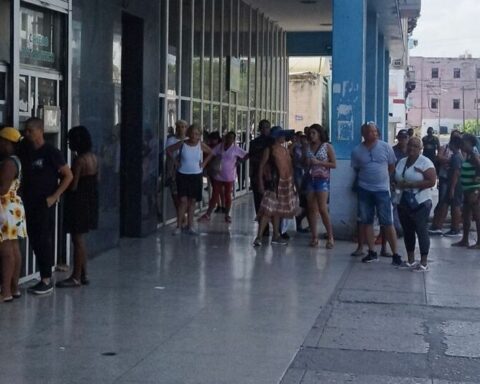Freely Convertible Currency (MLC) stores are stocked – as much as they can – with imported products, a no-brainer for any customer on which the official press. The newspaper Granma wonders, in a report entitled The missing links in the chainwhat are the producers who are not reaching the establishments doing wrong, because, in their opinion and that of the interviewees, the Government has done everything in its power for them.
“While the workers under his command strive to maintain a stable supply of fresh vegetables, two blocks away, the store in MLC Branch, of the Cimex corporation, sells imported spinach, beans and carrots,” the newspaper says about Jesús González, producer of an organic farm in Pinar del Río called Las Flores who insists that he would reach an agreement to supply these establishments, but they did not ask him.
Roberto Trujillo, head of marketing for the Provincial Delegation of Agriculture, blames the peasants for their lack of marketing mentality. “There’s a lot of misunderstanding, even among the most advanced growers,” he says.
The official says that, with the exception of honey, tobacco and charcoal, there is hardly any foreign trade, the tourism sector and the chain stores in MLC. From these sources they would obtain, he maintains, sufficient amounts and in foreign currency to acquire the inputs and technology they need.
The newspaper interviews Onay Martínez, an engineer in charge of a farm in Los Palacios, Tierra Brava, in the Pinar del Río municipality of Los Palacios, which “provides more than 200 tons of fruit,” without specifying whether they stay in Cuba or are sold. abroad. The producer indicates that it is not just about training, but that sometimes things as simple and relevant as the packaging in which the items go are not available on the Island, which do not meet international standards.
“All the necessary policies are written. Now the problem is in the mentality of the people, which has to change to take the missing step”
Martínez considers that it is easier to sell to Cuban chain stores or to tourism than to export, but he blames the business sector, “more focused on itself than on making cooperative productions. I think it is one of the weaknesses we currently have , which is not looking inward,” he says.
However, the engineer exempts the Government from any responsibility, since he considers that it has put a lot of “effort in eliminating all kinds of obstacles to the development” of the economy. “All the necessary policies are written. Now the problem is in the mentality of the people, which has to change to take the missing step,” he says,
From his farm come fruits and condiments that, according to the text, “are sold at points of sale and warehouses in Los Palacios and Pinar del Río”, and he can access the market in foreign currency.
For Juan Carlos, a 42-year-old fruit producer in Alquízar, Artemisa, the difficulties of placing his crops in stores accumulate from the very moment the harvest begins. “Getting boxes that preserve the fruit or vegetables until they are transferred for sale is already a headache,” he tells 14ymedio.
“Here we have wooden boxes, but the dividers and shelves, so that the fruit does not end up crushing with its own weight, do not appear anywhere,” he says. “Another thing is the packaging: you can’t market it in those stores without a minimum presentation of the product, but even getting a little bag to offer it by the pound is impossible right now.”
“I cannot compete with my strawberries with a Spanish producer that packs them in an attractive container, where everything is described: from the calories that the product has to how it can be used in some recipes. What I can do, if anything, is to put my fruits in a little bag or in a package with a small label, but that’s it. What product are people going to buy? The imported one, because it enters through the eyes”.
“Here we have wooden boxes but the dividers and shelves, so that the fruit does not end up crushing with its own weight, do not appear anywhere”
Juan Carlos has ventured into the sale of “frozen mango, mamey and guava pulp,” which he offers in bags. “I have clients who come to buy it here because they know that it is a good quality product and that we care a lot about hygiene, but it doesn’t make sense to move that anywhere without the minimum refrigeration conditions.”
“Refrigerators, labels, containers and fuel, without that my mango may be better than some imported cherries in syrup, but I will not be able to sell it in freely convertible currency or in a state store in pesos,” he admits. “It’s not about a lack of merchant mentality, but a lack of resources, of obstacles to buying what we need.”
The report of Granma insists that the final objective of the producer cannot be to sell to the stores in MLC, because then the products “would be inaccessible to the majority of the population,” but rather to encourage national production to stay in Cuba, occupying the space that is has given “an endless number of imported assortments” and allowing foreign exchange savings.
Two thirds of the text are dedicated to remembering that Raúl Castro already made a speech in 2007 in which he asked overcome the importing mentality. “In order to have more, we must start from producing more and with a sense of rationality and efficiency, so that we can reduce imports, first of all of food that is produced here,” said the general in his speech on July 26 of that year. .
According to Granmathat moment marked a turning point and allowed for a success story: that of Pinar del Rio artisan Claudio Roba, who said he was capable of producing all the necessary bats for the National Baseball Series.
“I cannot compete with my strawberries with a Spanish producer that packs them in an attractive container, where everything is described: from the calories that the product has to how it can be used in some recipes”
Roba made the bats for 50 pesos, compared to the 100 dollars it cost to bring them from abroad. That year, he remembers now, he produced almost a thousand bats, but then the contracts went down until they stopped. “It is sad that this money, which the country needs so much for other things, is used to buy something that we can do in Cuba,” he says.
Before ending the article, Granma makes a list of the measures that the Government has taken and that, in its opinion, should be assumed by producers, in order to improve production. “From 2011 to date, organizational, economic, managerial, financial, fiscal and worker income transformations have been carried out in the business system, aimed at facilitating the productive chain with the socialist state company,” he says before to expose the seven main ones.
However, fourteen years after Raúl Castro’s speech and eleven years after the first of the measures, the situation is even worse. The foreign trade data published by the National Office of Statistics and Information (Onei) corresponding to 2021 leave no room for doubt. Cuba imported four times more than it exported.
________________________
Collaborate with our work:
The team of 14ymedio is committed to doing serious journalism that reflects the reality of deep Cuba. Thank you for joining us on this long road. We invite you to continue supporting us, but this time becoming a member of our journal. Together we can continue transforming journalism in Cuba.








